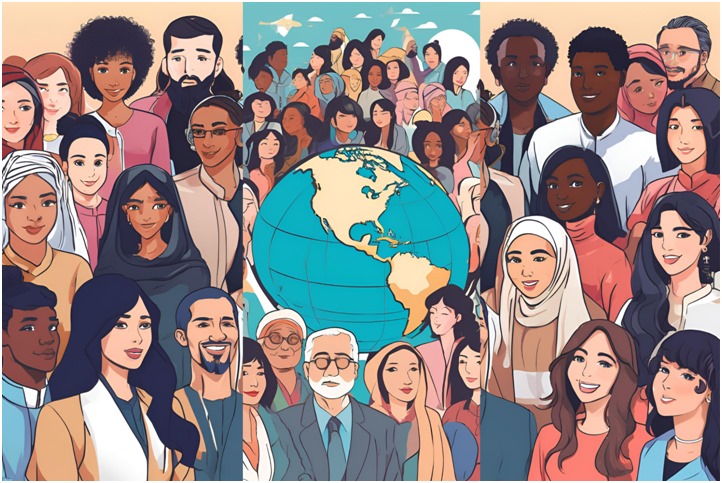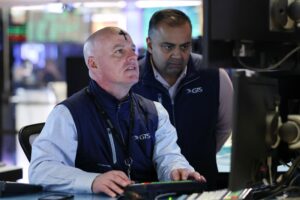
We live in a world where Artificial Intelligence (AI) is revolutionising our daily lives and reshaping business operations. According to the McKinsey Global Survey on AI, over 200 new AI use cases were created and explored in the past year, spanning industries from healthcare and finance to retail and logistics. As AI becomes more accessible, it creates numerous opportunities for non-technical individuals to apply AI within their professional fields. Concurrently, an interesting trend is emerging in the talent landscape: the rise of “Non-tech Tech Talent.” These individuals are often business professionals from diverse backgrounds rather than traditional tech experts. However, they contribute unique value with their “Tech-Enough” skills, shaping and driving the next wave of AI transformation, which means leveraging AI in their work day to generate business value and unlock new sources of growth.
The Difference Between “Tech-Savvy” and “Tech-Enough”
The distinction between being “Tech-Savvy” and “Tech-Enough” is an interesting dilemma. Have you ever felt that you are not “tech-savvy” but “tech-enough” to perform your work effectively? According to the Cambridge Dictionary, being “Tech-Savvy” means “knowing a lot about modern technology, especially computers,” typically involving deeper technical proficiency and specialisation in the digital and technology landscape. In contrast, being “Tech-Enough” signifies having sufficient technological knowledge to integrate industry expertise with technology applications, communicate effectively in business discussions, and convey ideas in non-technical terms within a business context. So, how are these Tech-Enough skills manifested by Non-tech Tech Talent?
Six Persona Types of Non-tech Tech Talent
Based on Tang’s seven-year Autoethnographic Research* in the tech sector across five industries, Non-tech Tech Talent can be exemplified through six persona types. You may resonate with more than one persona type when reflecting on your career span and various engagements in technology transformation. Alternatively, you might not identify with any of the persona types. Regardless, each persona contributes unique strengths in driving the new wave of AI innovation.
*Autoethnographic Research is a qualitative research method that involves using personal experience to understand cultural, social, or organisational phenomena. (Ellis, Adams, &Bochner, 2011)
- Tech-Enough People Magnet
“I am a people-centric leader who cares about the culture of my organisation and the well-being of my teams. I bring a wealth of business acumen and years of operational experience. I excel at leading people and winning support.”
Unique value: Consider the COO of a fintech app. Alex champions cross-departmental initiatives by leading operations teams and various stakeholders, ensuring everyone feels heard and aligned in fostering cross-functional AI adoption initiatives. [Podcast Link] - Tech-Enough Innovator
“I am a hands-on innovator who believes that anything is possible. I learn by doing and experimenting. I possess a wealth of creative energy that I tap into for creating and refining new products. I excel at bringing new ideas to life.”
Unique value: Consider the founder of an AI app. Rachael came from a non-tech background but is not constrained by a lack of coding knowledge. She learns technical skills online—such as AI or no-code courses—to build AI products that solve real-world problems. [Podcast Link] - Tech-Enough Scholar
“I am a dedicated scholar who values challenging the status quo and established norms to achieve breakthrough insights. With a rich knowledge base and a commitment to high standards, I excel at illuminating emerging trends.”
Unique value: Consider a Phd.-graduated entrepreneur. Rina started with a psychology background and applied her academic expertise and industry knowledge to predict the future skills needed by tech talent. [ Podcast Link] - Tech-Enough Executive
“I am a big-picture thinker with a strategic focus on seeing every situation holistically. I possess strong business acumen across a wide spectrum of functions and sectors. I excel at connecting the dots and unlocking future opportunities.”
Unique value: Consider the CEO of an organisation. Joe possesses a growth mindset toward Generative AI and a wide spectrum of business acumen and cross-sector people networks. He unlocks the opportunity to connect holistic leadership with global impacts. [Podcast Link] - Tech-Enough Message Amplifier
“I am an impactful leader who is passionate about sharing new knowledge. I am deeply committed to helping others learn and bringing contagious energy to my coaching. I excel at spreading knowledge to diverse audiences and empowering them.”
Unique value: Consider the Catalyst of a startup ecosystem. Amel understands AI trends and their implications to build a successful startup ecosystem where entrepreneurs are aware of the opportunities and resources for building future-ready startups. [Podcast Link] - Tech-Enough Experience Shaper
“I am an experience shaper who is passionate about understanding what customers think and feel. I possess deep empathy for their needs and expectations. I excel at transforming customer insights into exceptional experiences.”
Unique value: Consider the Host of a podcast channel. Lama applied her commercial acumen and a deep understanding of her audiences in crafting unique podcast experiences with her speakers. She also uses AI tools to enhance curated experiences. [Podcast Link]
Tech Talent Strategies for Tomorrow
While these Non-tech Tech Talent are traditionally regarded as business professionals and not as tech professionals, identifying these talent and assigning them to the right roles for AI transformation is crucial. According to the State of Organizations 2023 report by McKinsey & Company, approximately 30% of employees feel they are not in the right job, highlighting the importance of effectively matching skills to roles. As the landscape of technology and talent continues to evolve, creating a supportive community for Tech-Enough Talent is more important than ever. By establishing a community that encourages traditional non-tech individuals to rethink their “Tech-Enough skills” and embrace their “Non-tech Tech Talent” identity, building their sense of belonging in the tech space, we can empower them to take on critical roles in driving the next waves of AI transformation.
Coauthored by Tan Ting (Grace) Tang, Founder and CEO of Am I Tech Enough, &
Jo O’Driscoll-Kearney, Chief Learning Officer, Majid al Futtaim and World Economic Future Skills Alliance and Chief Learning Officer Member
Also Read :-
Redefining Luxury Living In Qatar With FGREALTY: Serban Gabriel Spirea
Redefining The Wellness And Beauty Industry Globally With Omorfia Group: Nadia Rahpaima






